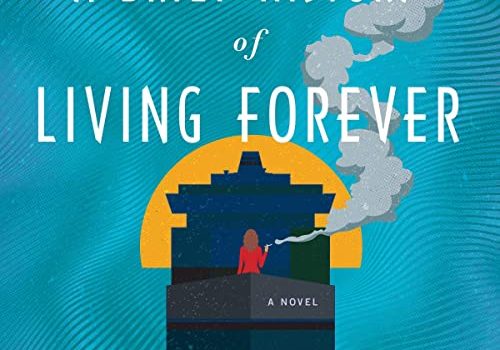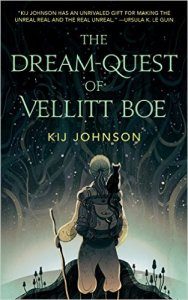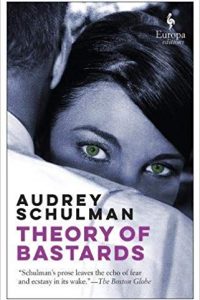Jake Casella Brookins Reviews A Brief History of Living Forever by Jaroslav Kalfař
 A Brief History of Living Forever, Jaroslav Kalfař (Little Brown 978-0-31646-318-8, $28.00, 320pp, hc) March 2023.
A Brief History of Living Forever, Jaroslav Kalfař (Little Brown 978-0-31646-318-8, $28.00, 320pp, hc) March 2023.
‘‘The downsides of living forever’’ is practically a genre unto itself at this point, with all manner of fiction devoted to the philosophical and existential crises likely to crop up when faced with eternal life. And, on a slightly different tack, realistic AI and brain-uploading technologies have their own sets of ethical complications, frequently explored in works from Richard Powers’s literary Galatea 2.2 to Greg Egan’s scientifically rigorous and superbly human Zendegi, to name just two: these are well-trod fascinations and concerns, with some of the technology seeming to get ever-more achievable. Jaroslav Kalfař’s A Brief History of Living Forever takes a dim and tragic view of its titular prospect, for a very simple reason: we can see who’s likely to fund its invention, and they’re the worst.
The novel is narrated by Adéla Slavíková – a Czech woman who was a political activist and aspiring artist in her youth, now living in relative poverty with her aging mother and possibly conspiracy-pilled adult son. After receiving a terminal medical diagnosis, she decides to go to America to seek out the daughter she gave up at birth – a daughter who, it so happens, is a leading researcher for a corporation seeking human immortality through either biological or digital means. Most of the book comes, seemingly, from beyond the grave, as the ethereal Adéla alternates between recollecting episodes from her youth and following her daughter and son in the present as they attempt to collect their mother’s body – uncovering some of the sordid depths of both unethical corporate experiments and the frightening authoritarian turns of both of their countries.
I kept expecting the novel to lean more into satire. Kalfař displays an extremely current sense of history – small details kept making me wonder: how fast did he write this? – and he has an eye for the simultaneously ludicrous and ominous nature of news as disparate as climate-activist vandalism and the political dangers of our current Florida Man. Coupled with the way it handles large-profile evils such as bigoted demagoguery and elite megalomania with a fairly light touch, it frequently seems poised to launch into a humorous send-up. A lot of this is front-loaded into the patently silly (and also disturbing and powerful) figures behind the VITA corporation: ‘‘people who would never age, thanks to vegetable juicing, people who craved disruption and fought a sense of impending doom with manic productivity.’’
Yet while A Brief History of Living Forever kept putting me in mind of speculative satirists, particularly in their more despairing moods – Atwood, maybe, or recent work such as Mat Johnson’s Invisible Things or Ned Beauman’s Venomous Lumpsucker – it plays its themes strangely earnestly. Fascism is, among other things, ridiculous, but A Brief History of Living Forever is not at particular pains to ridicule it. The banal horrors of a victorious American ‘‘Reclamation Party,’’ with its thuggish police and veneration of nativist hatred, are presented as straightforward warnings. The novel’s immortality-seekers, billionaire twins Steve and Mark, are supremely goofy as only the supremely wealthy can be, but that’s about as deep a critique as they get. (One of the stranger notes of the novel, given how central the buffoonish villainy of xenophobia and unfettered capitalism are to its premises, is how lightly it damns Reagan and Reaganism in their occasional appearances.)
Which is no mark against the novel, but, absent some tonal levity or vicariously triumphal plot, makes Adéla’s observations of personal and political plights rather grim and despairing. All credit to Kalfař, this is actually a bit of good character work: Adéla the youthful agitator, now barely able to even critique the forces swirling around her. And this is, despite the promise (or threat) of immortality and other near-future flourishes, primarily a singular character-study of a novel, its most vibrant and memorable episodes mostly drawn from Adéla’s flashbacks to the 1980s.
Within those flashbacks, Adéla presents us with her brief foray into acting, which I found to be absolutely the strongest and strangest element of the book. While living in Florida as an illegal immigrant, she begins a relationship with an amateur filmmaker, and they both become obsessed with adapting Karel Čapek’s 1936 novel War with the Newts. Working on a shoestring budget, using a single janky animatronic salamander, passion far outweighing skill, the description of the film is nonetheless enchanting, haunting. Kalfař manages to overlay, as though they were transparencies, their envisioned film and its pathetic actuality, and it’s the resonance between those two films, and their source material, that will stick with me. War with the Newts itself is a satire of inequality and bellicosity, providing one lens to read A Brief History of Living Forever through, as well as anchoring the novel to a specifically Czech SF tradition. Adéla and Michael’s adaptation has its own failed B-movie charms, but it’s also an intensely personal and relationship-focused conception, one that searches for a tragic comfort in even the doomed act of connection.
The more flashily science-fictional elements of A Brief History of Living Forever pale, actually rather strikingly, in comparison to Adéla’s story. The description of her daughter’s life and involvement in immortality research are basically summaries; the novel’s not deeply interested in the practical complexities and ramifications of brain uploading, because it sees too clearly the contrast between a life like Adéla’s and what’s actually offered by the promise of tech-bro capitalism. If one thinks about personal immortality, but in the hands of the kind of people who brought us Facebook, death begins to sound really quite attractive.
Jake Casella Brookins is from the Pennsylvania Appalachians, and spent a fantastic amount of time in the woods. He studied biology, before switching over to philosophy & literature, at Mansfield University. He’s been a specialty coffee professional since 2006. He’s worn a lot of coffee hats. He worked in Upstate New York and Ontario for about 8 years. He’s been in Chicago since 2013; prior to the pandemic, he worked for Intelligentsia Coffee in the Loop. Starting in 2021, he’s been selling books at a local indie bookstore. He lives with his wife, Alison, and their dogs Tiptree & Jo, in Logan Square.
This review and more like it in the April 2023 issue of Locus.
 While you are here, please take a moment to support Locus with a one-time or recurring donation. We rely on reader donations to keep the magazine and site going, and would like to keep the site paywall free, but WE NEED YOUR FINANCIAL SUPPORT to continue quality coverage of the science fiction and fantasy field.
While you are here, please take a moment to support Locus with a one-time or recurring donation. We rely on reader donations to keep the magazine and site going, and would like to keep the site paywall free, but WE NEED YOUR FINANCIAL SUPPORT to continue quality coverage of the science fiction and fantasy field.
©Locus Magazine. Copyrighted material may not be republished without permission of LSFF.







